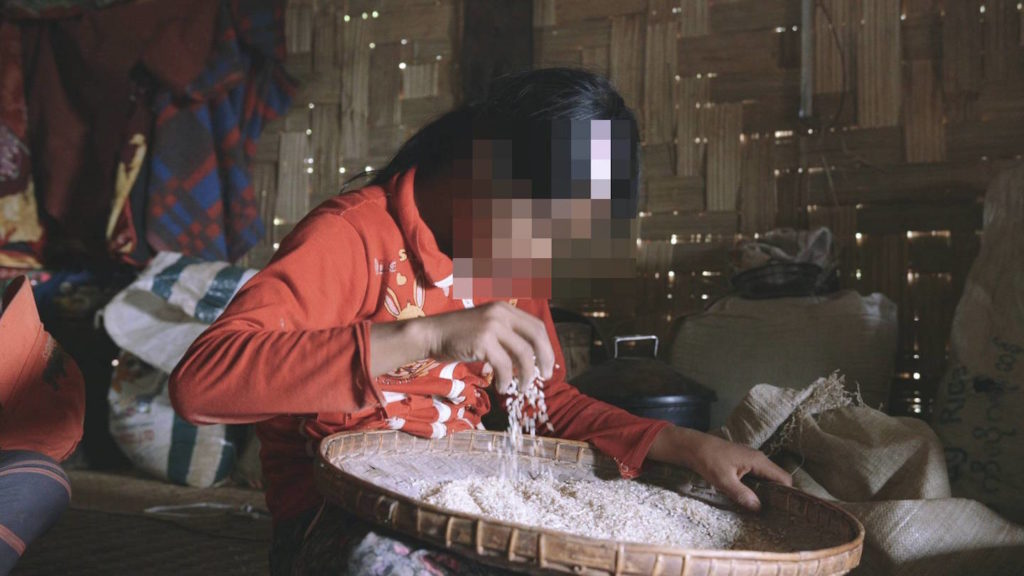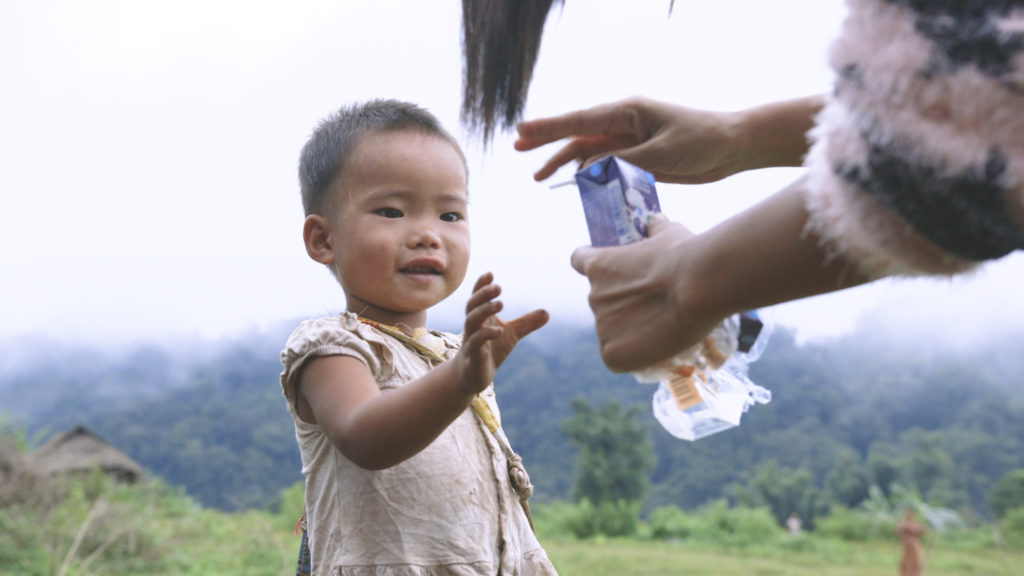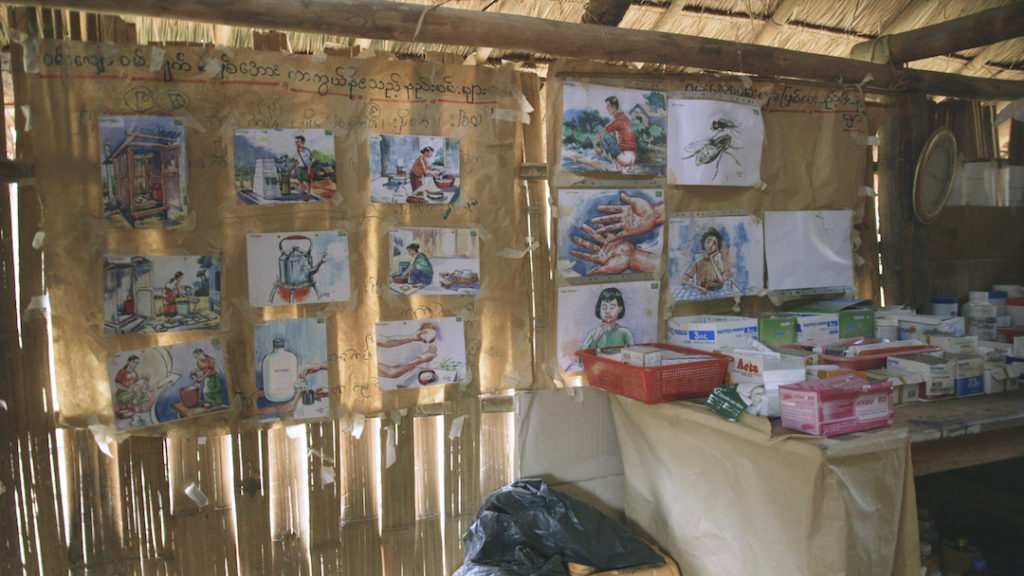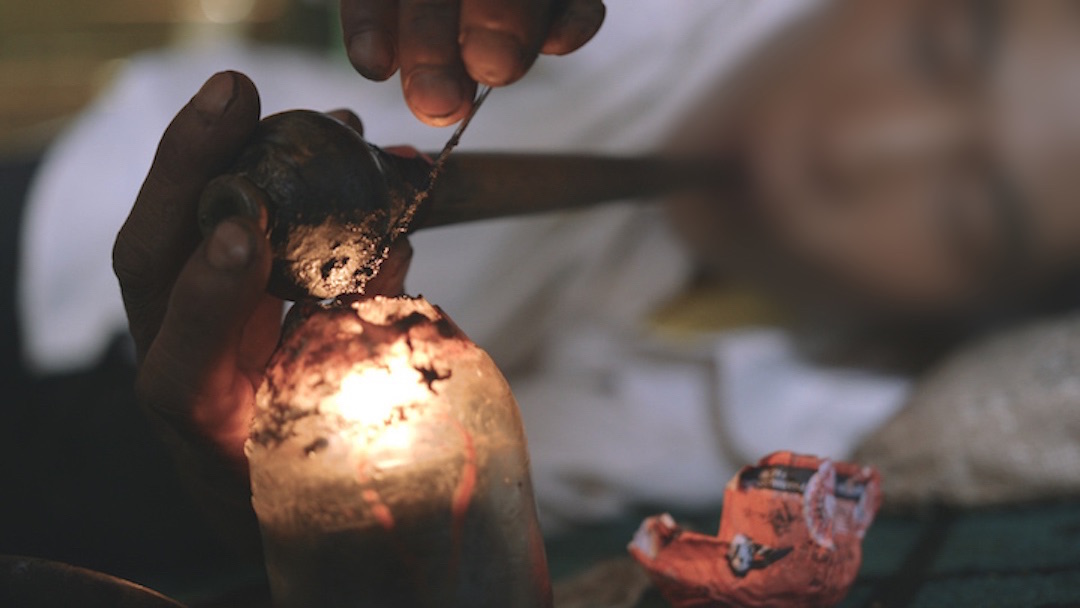Lway Kay* sits inside a dimly lit shack picking bugs and stale rice from a large bag. She is incredibly adept at preparing the rice for her family’s meals, and she needs to be. They have have neither time nor money to waste.
I gesture that I’d like to take her picture, but she giggles shyly and runs to the door leading outside.
Lway Kay looks older than her likely age, something difficult to determine as people in her village traditionally don’t keep track of birthdates. She’s definitely in her early teens, but as one of thousands subjected to modern-day slavery in Myanmar, her life has been unimaginably hard.
Watch our Coconuts TV feature about modern-day slavery in Myanmar’s Shan State
https://www.youtube.com/watch?v=-zHUvFLhT7E&t=7s
Her family home, Mongyaw, is a village lost in time, hidden in a lush jungle valley two-hours’ drive from the nearest town. The people here live without electricity, without machines, and have very little contact with the outside world. But while the village is surrounded by beautiful vistas and fresh air, something sinister is going on beneath the surface.
Mongyaw is at the heart of a drug crisis. Too many men have given up working the fields in exchange for an opium pipe, forcing the women to care for their families alone. It is a common story across Myanmar’s northern Shan State, an area almost completely off limits to foreigners except in a few heavily monitored areas. That inaccessibility is due to Shan State’s unique status: home to the world’s longest-running civil war.
The war began in 1958, roughly 10 years after Myanmar gained independence from Britain, when the central government refused to recognize a deal they had made with the people of Shan State. The deal would have allowed them to break away from the country after 10 years if they no longer wanted to remain part of what was then known as Burma.
The broken promise gave way to a violent independence movement that birthed numerous armed resistance groups. Today, the Shan State Army South, the Kachin Independence Army, and the Ta’ang National Liberation Army are the most powerful. They are in constant conflict with the central government as well as local militia groups that work for them.
In its nearly 60 years, the war has claimed countless lives, displaced thousands of people and severely restricted development in the region.

Further complicating matters is Shan State’s geography. Sharing borders with Laos, Thailand and China, it sits in the heart of the infamous Golden Triangle, meaning drugs are readily available. According to the NGO International Crisis Group, Shan State has emerged as one of the largest global centers for the production of methamphetamine. The trade in yaba, along with heroin, has become so profitable it dwarfs the formal economy.
And that is why in villages like Mongyaw, drugs are as common as rice.
“I would say that 80-90 percent of the people in the village are addicted to drugs,” says Soe Min the lone volunteer at a small, severely undersupplied medical clinic in the village.
Mongyaw has less than 100 residents, but these are staggering percentages.
So how did the drug problem become so out of control? The answer is complicated but connected to the civil war.
Over the years, the Myanmar government has employed the services of local militias in their fight against the Shan State rebel armies. However, the central government doesn’t always have enough money to pay those soldiers. As a result, the militias were forced to come up with ways to fund their operations, and because they can act with complete impunity, they turned to the drug trade.
“(The government) doesn’t have enough money to provide a salary to the militia, that’s why they sell (drugs). Most of them are also drug users. The militia will then make contact with local businessmen, mostly the Chinese, to make a plan, and together they have created this situation” says Soe Min.

It’s an incredibly sad situation whereby civilians, the people who suffer most during an armed conflict, are actually paying for the conflict via their addiction. And because many cannot afford to maintain their addictions, an even more heartbreaking situation has arisen.
“Because of drugs, parents sell their own children. They’re only interested in drugs, they don’t take care of their children, they don’t take responsibility for their children, and that’s why they sell [them] to other people,” explains Poe Jiang, a representative for the Ta’ang Women’s Organization (TWO), an NGO that monitors human rights issues in Shan State.
Debt-ridden parents have taken to using their children as a means of clearing the money they owe, she explains. This can take the form of bonded slavery with the drug suppliers, migrant labor to China (from where the TWO says many never return), and even offering their children up in arranged marriages to clear the debt.
“Because of a drug debt her parents owed, a 14-year-old girl was forced to marry a local militia leader. Initially, the militia leader gave drugs to the father, but after a while he refused to take any payment, all he wanted to marry the man’s daughter. Eventually this underage, 14-year-old had to marry a 70-year-man,” says Poe Jiang.
Cases of forced marriage are, she admits, rare, what is far more common are the cases of bonded slavery. Which brings us back to Lway Kay.

Lway Kay has been working for a Chinese family in the next village over for the past three years. She still has another nine years before, the family says, she will be free. She mainly prepares food, cleans the house, and tends to any animals the family owns. She receives no pay as she is working off the debts that her parent built up funding their drug habit. In reality, it is unlikely the debt will ever be paid off.
The parents borrowed about 500,000 kyat (US$330), a small fortune in this part of the world. The average wage in the village is about US$3 per day, so in theory it would take less than a year to pay back the debt.
However, Lway Kay’s aunt says that no deal has been negotiated, and the money lender has refused a full repayment, demanding that Lway Kay be sent to the house to work and arbitrarily determining it will take 12 years to repay the debt.
Unsurprisingly, Lway Kay is not happy about her situation. She has returned to her grandmother’s house in Mongyaw and doesn’t want to go back to work. Her family support her, but know that there is no other option. Refusal to work could lead to repercussions if the money lenders are connected to local militia.

For now, there seems to little hope for Shan State and the people of Mongyaw village. U Kyaw Aung, the Ta’ang National Party Chairman, says the government has conducted raids on homes in the provincial capital of Lashio and found they were owned by the Chinese and serving as fronts for illegal drug production.
“The houses that were seized were manufacturing not just opium but other drugs as well,” he says. “There they have been using under-educated villagers in their drug operations. We were able to help some of the child workers who were part of these operations. We’ve helped some of them, however we can’t help all of them.”
The crackdowns are a start, but the lack of funding for law enforcement as well as the continuation of the long-running conflict mean progress is slow. U Kyaw Aung believes it will take more than the efforts of the Ta’ang National Party to solve the crisis and that the national government needs to prioritize establishing the rule of law in local villages.
But for children like Lway Kay and countless others forced into slavery, change may come too late. For now, the cycle of slavery seems likely to continue for decades to come.
*Name has been changed to protect the identity of a minor.



Reader Interactions